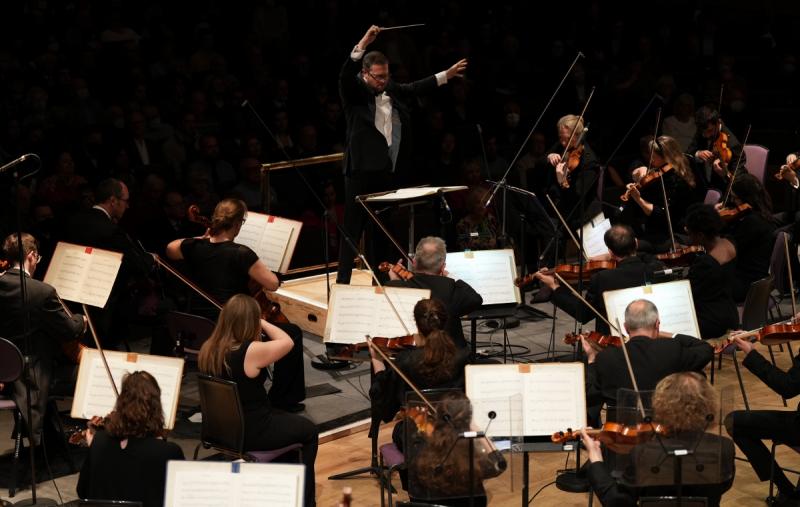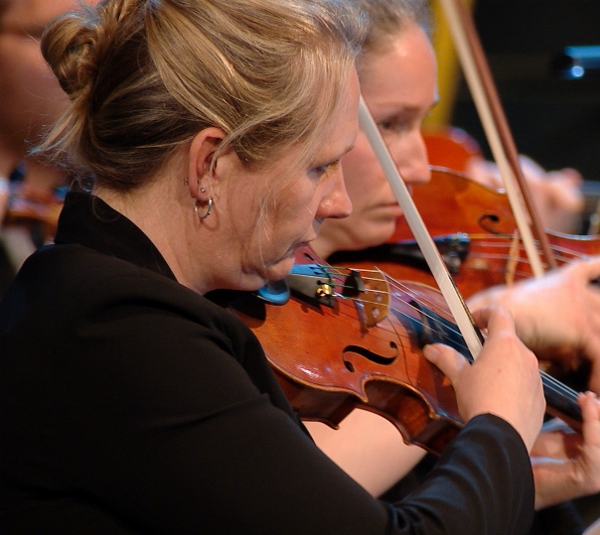Hallé, Wilson, Bridgewater Hall, Manchester review - valedictory Vaughan Williams | reviews, news & interviews
Hallé, Wilson, Bridgewater Hall, Manchester review - valedictory Vaughan Williams
Hallé, Wilson, Bridgewater Hall, Manchester review - valedictory Vaughan Williams
Contrasting radical young Holst with an 80-year-old’s final symphony

The baton passed, metaphorically, to the Hallé last night in the Vaughan Williams symphony cycle shared between them and the BBC Philharmonic to mark the composer’s 150th anniversary. Literally, that baton was in the same hand as on the last date, for it was John Wilson who conducted the Ninth Symphony, as he had the second and seventh 12 days ago. This time VW was paired with Holst, as the second part of the concert consisted of The Planets.
It made an interesting comparison, as the two composers were friends as young men, and though Holst died 24 years before Vaughan Williams and The Planets was written (mainly) during the Great War, while the Ninth Symphony came well after the Second World War, it’s the earlier work that still sounds the more radical. By 1958, the tide of musical fashion was turning away from tradition, and since VW’s final symphony was written by a man in his eighties, it was easy to consider it the dying fall of a great career.
From our perspective we can perhaps see that it was in his nature to develop and modify a style that had worked for him all his life. There was no need to turn elsewhere – though the instrumentation of the symphony added the tones of saxophones and a solo flugelhorn to the orchestral palette. But it’s a concise, four-movement work with the classical elements of slow movement and scherzo in the middle, and substantial (though hardly conventional) outer movements to make its argument.
 John Wilson’s reading delighted in the sweetly nostalgic episodes that are the glory of the Ninth, though he also built a superb head of tension in the finale, bringing its climax to a real high point before the last, fading moments. That balanced the grim heaviness of the opening, but VW undoubtedly knew how to maintain interest through contrast, and the textures and harmonic language he’d used with such appeal from his early years to evoke an “English” lyrical feeling kept popping up to entice and charm. The Hallé strings, at full 60-odd strength, are masters of this sweet gentility, and were led by Hannah Perowne (pictured). They excelled in the second movement, while the wind and brass were effective in the clumping rhythms and swirling figuration of the scherzo (aspects of the writing that are themselves strangely reminiscent of Holst’s in The Planets). The last movement, with its high sustained strings, soaring melodies and emphatic counterpoint, brought one evocative paragraph after another, with all the solo resources of this orchestra in play.
John Wilson’s reading delighted in the sweetly nostalgic episodes that are the glory of the Ninth, though he also built a superb head of tension in the finale, bringing its climax to a real high point before the last, fading moments. That balanced the grim heaviness of the opening, but VW undoubtedly knew how to maintain interest through contrast, and the textures and harmonic language he’d used with such appeal from his early years to evoke an “English” lyrical feeling kept popping up to entice and charm. The Hallé strings, at full 60-odd strength, are masters of this sweet gentility, and were led by Hannah Perowne (pictured). They excelled in the second movement, while the wind and brass were effective in the clumping rhythms and swirling figuration of the scherzo (aspects of the writing that are themselves strangely reminiscent of Holst’s in The Planets). The last movement, with its high sustained strings, soaring melodies and emphatic counterpoint, brought one evocative paragraph after another, with all the solo resources of this orchestra in play.
The Planets may have been the principal reason for a reassuringly good turnout of Hallé attenders on a Thursday night, and Wilson gave a disciplined and thrilling account of it. It helps to have a big body of strings, of course, and also to add a fourth trombone to the line-up, producing a fruity roar in the brass chorus that was telling in effect again and again.
“Mars” was skilfully controlled in dynamic rise and fall, proving both impressionistic and scarily loud, and with careful control of the forward flow in “Jupiter” we enjoyed the best of each of its themes, while “Saturn” was built to each of its high points and an effect that was (as Holst wanted) quite devastating at the climax. There was clarity and precision, too, in gentler sounds and delicate effects, which were as much the mark of this reading as the big ones. Familiar fare it may be to orchestral players, but this performance was never a routine one.
- Broadcast live on Radio 3
- More classical reviews on theartsdesk
rating
Explore topics
Share this article
The future of Arts Journalism
You can stop theartsdesk.com closing!
We urgently need financing to survive. Our fundraising drive has thus far raised £49,000 but we need to reach £100,000 or we will be forced to close. Please contribute here: https://gofund.me/c3f6033d
And if you can forward this information to anyone who might assist, we’d be grateful.

Subscribe to theartsdesk.com
Thank you for continuing to read our work on theartsdesk.com. For unlimited access to every article in its entirety, including our archive of more than 15,000 pieces, we're asking for £5 per month or £40 per year. We feel it's a very good deal, and hope you do too.
To take a subscription now simply click here.
And if you're looking for that extra gift for a friend or family member, why not treat them to a theartsdesk.com gift subscription?
more Classical music
 First Person: Manchester Camerata's Head of Artistic Planning Clara Marshall Cawley on questioning the status quo
Five days of free events with all sorts of audiences around Manchester starts tomorrow
First Person: Manchester Camerata's Head of Artistic Planning Clara Marshall Cawley on questioning the status quo
Five days of free events with all sorts of audiences around Manchester starts tomorrow
 Goldscheider, Brother Tree Sound, Kings Place review - music of hope from a young composer
Unusual combination of horn, strings and electronics makes for some intriguing listening
Goldscheider, Brother Tree Sound, Kings Place review - music of hope from a young composer
Unusual combination of horn, strings and electronics makes for some intriguing listening
 theartsdesk Q&A: composer Donghoon Shin on his new concerto for pianist Seong-Jin Cho
Classical music makes its debut at London's K-Music Festival
theartsdesk Q&A: composer Donghoon Shin on his new concerto for pianist Seong-Jin Cho
Classical music makes its debut at London's K-Music Festival
 Helleur-Simcock, Hallé, Wong, Bridgewater Hall, Manchester review - moving lyricism in Elgar’s concerto
Season opener brings lyrical beauty, crisp confidence and a proper Romantic wallow
Helleur-Simcock, Hallé, Wong, Bridgewater Hall, Manchester review - moving lyricism in Elgar’s concerto
Season opener brings lyrical beauty, crisp confidence and a proper Romantic wallow
 Kohout, Spence, Braun, Manchester Camerata, Huth, RNCM, Manchester review - joy, insight, imagination and unanimity
Celebration of the past with stars of the future at the Royal Northern College
Kohout, Spence, Braun, Manchester Camerata, Huth, RNCM, Manchester review - joy, insight, imagination and unanimity
Celebration of the past with stars of the future at the Royal Northern College
 Jansen, LSO, Pappano, Barbican review - profound and bracing emotional workouts
Great soloist, conductor and orchestra take Britten and Shostakovich to the edge
Jansen, LSO, Pappano, Barbican review - profound and bracing emotional workouts
Great soloist, conductor and orchestra take Britten and Shostakovich to the edge
 Jakub Hrůša and Friends in Concert, Royal Opera review - fleshcreep in two uneven halves
Bartók kept short, and a sprawling Dvořák choral ballad done as well as it could be
Jakub Hrůša and Friends in Concert, Royal Opera review - fleshcreep in two uneven halves
Bartók kept short, and a sprawling Dvořák choral ballad done as well as it could be
 Hadelich, BBC Philharmonic, Storgårds, Bridgewater Hall, Manchester review - youth, fate and pain
Prokofiev in the hands of a fine violinist has surely never sounded better
Hadelich, BBC Philharmonic, Storgårds, Bridgewater Hall, Manchester review - youth, fate and pain
Prokofiev in the hands of a fine violinist has surely never sounded better
 Monteverdi Choir, ORR, Heras-Casado, St Martin-in-the-Fields review - flames of joy and sorrow
First-rate soloists, choir and orchestra unite in a blazing Mozart Requiem
Monteverdi Choir, ORR, Heras-Casado, St Martin-in-the-Fields review - flames of joy and sorrow
First-rate soloists, choir and orchestra unite in a blazing Mozart Requiem
 Cho, LSO, Pappano, Barbican review - finely-focused stormy weather
Chameleonic Seong-Jin Cho is a match for the fine-tuning of the LSO’s Chief Conductor
Cho, LSO, Pappano, Barbican review - finely-focused stormy weather
Chameleonic Seong-Jin Cho is a match for the fine-tuning of the LSO’s Chief Conductor
 Classical CDs: Shrouds, silhouettes and superstition
Cello concertos, choral collections and a stunning tribute to a contemporary giant
Classical CDs: Shrouds, silhouettes and superstition
Cello concertos, choral collections and a stunning tribute to a contemporary giant
 Appl, Levickis, Wigmore Hall review - fun to the fore in cabaret and show songs
A relaxed evening of light-hearted fare, with the accordion offering unusual colours
Appl, Levickis, Wigmore Hall review - fun to the fore in cabaret and show songs
A relaxed evening of light-hearted fare, with the accordion offering unusual colours

Add comment